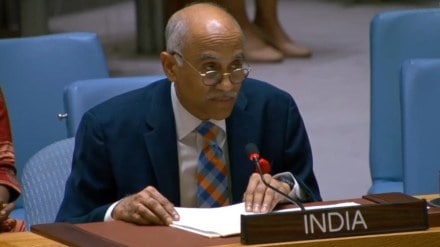India hit out against Pakistan at the UN Security Council (UNSC) on Tuesday. In a major statement during the Open Debate on Women Peace and Security, Permanent Representative of India to the United Nations, Parvathaneni Harish, said India has to bear the “delusional tirade” of Pakistan each year, with Jammu and Kashmir central to the debate every time.
Harish laid out his stance after Counsellor Saima Saleem, a member of the Permanent Mission of Pakistan to the UN, spoke out on the sufferings of Kashmiri women, who she said, “have endured sexual violence deployed as a weapon of war.” Consequently, the Indian representative to the UN launched his scathing retaliation, alluding to the Pakistan Army’s brutal military operation, the 1971 Operation Searchlight.
Permanent Rep of India to the UN Parvathaneni Harish speaks out against Pakistan
“Every year, we are unfortunately fated to listen to the delusional tirade of Pakistan against my country, especially on Jammu and Kashmir, the Indian territory they covet,” he said at the UN event this week. “Our pioneering record on the Women, Peace and Security agenda is unblemished and unscathed. A country that bombs its own people, conducts systematic genocide, can only attempt to distract the world with misdirection and hyperbole.”
Directing his focus to the notorious 1971 operation, he went on to describe Pakistan as a “country that conducted Operation Searchlight in 1971 and sanctioned a systematic campaign of genocidal mass rape of 400,000 women citizens by its own army.” Parvathaneni Harish further pushed that the world was fully cognisant of “Pakistan’s propaganda.”
The Operation Searchlight Harish referred to was a military operation, which was launched in March 1971 to curb the Bangladesh nationalist movement, and resulted in ruthless, unspeakable horrors. To honour the countless victims killed during the liberation war, Bangladesh has long observed March 25 as the Genocide Day or Genocide Remembrance Day.
According to Bangladeshi Embassy officials, the day “commemorates the tragic events of 1971 when the Pakistani military launched a brutal crackdown on the Bengali population – particularly targeting intellectuals, students, and civilians who were advocating for the independence of Bangladesh,” and honours “the memory of the countless lives lost and to reaffirm the commitment to uphold the principles of justice, freedom, and human rights.”
#WATCH | At the UNSC Open Debate on Women Peace and Security, Permanent Representative of India to the UN, Parvathaneni Harish says, "Every year, we are unfortunately fated to listen to the delusional tirade of Pakistan against my country, especially on Jammu and Kashmir, the… pic.twitter.com/KngC3ku98O
— ANI (@ANI) October 7, 2025
What Pakistan said at the UN
Pakistan’s Saima Saleem said, “UN human rights mechanisms, including the Office of the High Commissioner for Human Rights and Special Procedures along with organisations such as Amnesty International, Human Rights Watch, and Médecins Sans Frontières, have documented these violations.”
“To exclude Kashmiri women from the Women, Peace and Security agenda erases its legitimacy and undermines its universality. The Jammu and Kashmir dispute is on this Council’s agenda and therefore, future reports must reflect their plight accordingly.”
